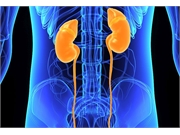And, serum urate lowering with allopurinol did not affect GFR in T1DM and diabetic kidney disease
THURSDAY, June 25, 2020 (HealthDay News) — Allopurinol does not affect estimated glomerular filtration rate (eGFR) in patients with chronic kidney disease and does not result in a clinically meaningful benefit in kidney outcomes from serum urate reduction among patients with type 1 diabetes and early-to-moderate diabetic kidney disease, according to two studies published in the June 25 issue of the New England Journal of Medicine.
Sunil V. Badve, Ph.D., from the George Institute for Global Health in Newtown, Australia, and colleagues randomly assigned adults with stage 3 or 4 chronic kidney disease at risk for progression to receive allopurinol or placebo. Due to slow recruitment, enrollment was stopped after 369 of 620 intended patients were randomly assigned to allopurinol (185 patients) or placebo (184 patients). Three patients withdrew immediately from each group. The researchers found that the change in eGFR rate did not differ significantly for the allopurinol and placebo groups (−3.33 versus −3.23 mL/min/1.73 m² per year; mean difference, −0.10 mL/min/1.73 m²; 95 percent confidence interval, −1.18 to 0.97; P = 0.85).
Alessandro Doria, M.D., Ph.D., M.P.H., from the Joslin Diabetes Center in Boston, and colleagues randomly assigned participants with type 1 diabetes and early-to-moderate diabetic kidney disease to receive allopurinol (267 patients) or placebo (263 patients). The researchers found that the mean serum urate level decreased from 6.1 to 3.9 mg/dL with allopurinol and was unchanged at 6.1 mg/dL with placebo. After three years of treatment plus a two-month washout period, the between-group difference in the mean iohexol-based GFR was 0.001 mL/min/1.73 m² (95 percent confidence interval, −1.9 to 1.9; P = 0.99).
“As is often the conclusion in clinical research, more high-quality randomized, controlled trials are needed,” write the authors of an accompanying editorial.
Several authors from the Doria study disclosed financial ties to the pharmaceutical industry.
Abstract/Full Text – Badve (subscription or payment may be required)
Abstract/Full Text – Doria (subscription or payment may be required)
Editorial (subscription or payment may be required)
Copyright © 2020 HealthDay. All rights reserved.








